Worlds Apart

In a democracy, the voice of the people (“vox populi”) is supposed to be the voice of God (“vox dei”). In the United States, leaders are supposed to rely on the consent of the governed. Yet, within the realm of foreign policy, the popular will is not being reflected in the views of elected leaders and experts. Although public opinion can be capricious and grand strategies must be developed to withstand changing sentiments, a fundamental premise of this project is that policymakers must be sensitive and responsive to the wishes of their constituents.
This project seeks to (1) illustrate the chasm which exists between the interests and concerns of foreign policy elites and those of ordinary citizens, and (2) identify the reasons why Americans are increasingly disenfranchised from foreign policy decisions being made in Washington.
View our reports from 2019, 2020, 2021, 2022, and 2023 to see more work on this topic.
This annual survey is part of Independent America, a multi-year research project led out by IGA senior fellow Mark Hannah, which seeks to explore how US foreign policy could better be tailored to new global realities and to the preferences of American voters.
Some names and references have changed since the publication of this report, including references to the Eurasia Group Foundation (EGF), the former name of the Institute for Global Affairs.
Worlds Apart:
U.S. Foreign Policy and American Public Opinion

Executive Summary | Introduction | Who Took Our Survey?
Specific Findings | Conclusion | Methodology
Executive Summary
A new, national survey commissioned by the Eurasia Group Foundation (EGF) reveals the American public supports a more restrained approach to international relations and military interventions. However, this desire for a more focused foreign policy is at odds with the more expansive role generally favored by foreign policy experts.
This is not terribly surprising. As the United States emerged from the Cold War as the world’s sole superpower, foreign policy think tanks and their funders began to focus on how the United States could use its singular influence to promote American values and defend American interests in every region of the world. This geopolitical triumph was construed by foreign policy leaders as a mandate to secure for people everywhere the individual and economic freedoms enjoyed by Americans. Representative democracy and free market economics were seen as universal birthrights, and were often promoted with irresistible economic incentives and defended with irrepressible military force.
In this system, which international relations scholars refer to as “liberal hegemony,” democracy promotion often veered into “regime change” and “nation building” tactics. Now, many Americans who cherish the values the United States champions appear dissatisfied with the manner in which it champions them.
We asked more than one thousand respondents detailed questions about their foreign policy views, and the following observations are included among our study’s findings:
- Support for American exceptionalism and leadership is linked to the power of America’s example, and is not necessarily indicative of support for active intervention in global affairs.
- When asked how to “best achieve and sustain peace” in the world, Democrats chose “global economic… [and] free trade” as their first choice, over democracy promotion. Republicans chose “a focus on the domestic needs and the health of American democracy” as their first choice, over “maintaining over- whelming strength” of its military as a deterrent.
- Young people are often perceived to be more likely to support intervention to stop human rights abuses. Our results challenge this perception. People under 30 years old were the most likely to choose answer options which would, in effect, abstain from the using force to stop humanitarian abuses. When confronting human rights abuses, across party affiliation, restraint was the first choice, U.N. leadership was the second choice, and US-led intervention was the last choice.
- Asked how the United States should respond if, in the wake of the Trump administration’s withdrawal from the Iran nuclear deal, “Iran gets back on track with its nuclear weapons program,” there was bipartisan consensus in support for diplomacy over military action. Eighty percent of respondents chose one of two diplomatic options for trying to maintain a non-nuclear Iran. Of the remaining respondents, significantly more people believed “Iran has the right to defend itself even if it means developing nuclear weapons” than supported a “preemptive strike on Iran to prevent its government from acquiring nuclear weapons.”
- When faced with a hypothetical situation in which a NATO ally in the Baltics was invaded by Russia, reminded of the treaty’s requirement for mutual defense, and told “the only way to expel Russia… is a military response,” Americans were deeply ambivalent on whether to retaliate. Fifty-four percent supported military action while 46 percent opposed. The reasons for their support and opposition are discussed within this report.
- Almost half (45 percent) of respondents thought lawmakers should maintain the current level of military spending. Of the remaining respondents, more than twice as many thought we should decrease spending than thought we should increase it. The most popular rationale for decreasing military spending was that the United States “has other priorities on which it could be spending this money.” The second most cited reason was that the current “level of military spending is fiscally irresponsible” and that we should prioritize “pay[ing] down the national debt or reduc[ing] taxes.”
- Americans are split along party lines when asked about the “greatest threat” facing the country. Democrats and Independents cited “a rise in populist and authoritarian governments” while Republicans cited “high levels of immigration.”
- More Americans hold what EGF board president Ian Bremmer calls an “Independent America” worldview (i.e., America must focus more on its own domestic challenges than on the challenges that come with international leadership) than either an “Indispensable America” worldview (i.e., American leadership is necessary for global stability and therefore American peace and prosperity) or a “Moneyball America” worldview (i.e. foreign policy should be driven by a focused calculation of costs and benefits to the national interest). The prevalence of this Independent America worldview held across every age group, partisan political identification, and income level we surveyed. Using another typology developed by Walter Russell Mead, however, we found some differences in worldview by party identification.
Introduction: Promoting Democracy at Home
“Vox populi, vox Dei.” The voice of the people is the voice of God. The Latin maxim expresses a foundational assumption of democracy: that expressions of the public’s opinions, beliefs, and values ought to be respected, if not revered. Yet as this paper reveals, within the realm of foreign policy, the voice of the people is not being faithfully represented by the views of experts. In short, Americans desire a much more restrained foreign policy than the one currently being pursued by their government. This maxim doubles as the motivating principle of this study, which set out to elucidate, and take seriously, how members of the American public perceive their country’s international role.
Much has been made about this precarious moment for democracy, and rightly so. Authoritarian leaders and ultranationalist political parties are competing in national elections with alarming success. In the United States, the election of Donald Trump caught even the most astute and seasoned political prognosticators by surprise. After all, the United States is the leader of what has become known as the “rules-based international order.” In the aftermath of World War II, it created those rules and established the institutions which would enforce them. The World Bank and the International Monetary Fund would make international lending contingent on democratic reforms and trade liberalization, the United Nations would promote diplomacy as the first resort for nations looking to redress their grievances, and military alliances such as the North Atlantic Treaty Organization (NATO) would protect democracies against invasion.
• When governing is unyoked to public opinion, a deficit of democracy accrues.
• When American foreign policy is pursued without significant public support, our government is perceived by foreign governments as a less reliable friend and a less resolute foe.
• When foreign policy fails to reflect the diversity of public opinion, legitimate policy ideas can be frozen out of serious debate.
After the end of the Cold War and the collapse of Soviet communism, this rules-based international order has come to be reified by foreign policy thinkers, and seen as essential to America’s national interests and security. The prevailing wisdom is that active international engagement created the conditions for globalization which, in turn, advanced prosperity and security for the United States. So how could a candidate who ran in flagrant opposition to globalism and the American-led rules generate such political support?
In short, while U.S. policymakers have been focused on promoting and protecting democracy abroad, some have neglected parts of their core democratic obligations at home.
In the wake of Trump’s election, many have written about the corrosion of democracy—and the need to “re-democratize”—within the United States. Some have insisted Donald Trump is a beneficiary, not the source, of declining democratic norms. They cite the rise in partisan polarization and incivility which preceded the 2016 election. But there’s another democratic norm which, when ignored, supplies an opportunity for populist candidates such as Donald Trump: regard for the popular will.
In the foreign policy realm, a great gap persists between foreign policy leaders’ views and those of the American public. A significant body of research has emerged in recent years to describe the severity and scope of this divergence.1 This report contributes new findings from a survey recently commissioned by EGF which adds confirmation, elaboration, and explanation to the extant research.
Before proceeding, there are three important points about the role of public opinion in policy making. In a democracy, laws and policies are predicated on the consent of the governed. As such, elected leaders are expected to be sensitive and responsive to the needs and interests of their constituents. A deficit of democracy accrues when governing is unyoked to public opinion. This likely occurs today.
Still, the United States is a representative, not a direct, democracy. Elected leaders are not expected to merely follow the collective opinion of their constituents. They ought to lead that opinion. This is especially true in areas such as foreign policy, where specialized knowledge informs policy debates. The Brexit vote in the United Kingdom spectacularly demonstrated how foreign policy making by referenda can produce chaotic consequences. And to be sure, political scientists differ on the wisdom, consistency, and stability of public opinion.2
However, a core assumption of this report is that, within a democracy, the beliefs, judgments, and opinions of the public must be taken seriously by policymakers. Whether attempting to follow or lead public opinion on foreign policy, elected representatives are duty-bound to critically engage with it. But it’s not just duty that should compel them to heed public opinion. It is a commitment to effective policymaking. This leads us to the second point: when American foreign policy is pursued without significant public support, our government is perceived by foreign governments as a less reliable friend and a less resolute foe. This creates commitment problems internationally and confidence problems at home. Passively ignoring or actively neglecting the popular will—especially in matters as grave as war and peace—could further undermine the public’s confidence in the responsiveness of its elected leaders.
Finally, when orthodoxy forms among experts as foreign policy fails to reflect the diversity of public opinion, legitimate policy ideas can be frozen out of serious debate. Intelligent and thoughtful proposals to decrease defense spending or reevaluate the War on Terror are dismissed as outside the boundaries of conventional wisdom. Opening up foreign policy to new ideas—including some ideas and opinions more supported by the public—is a way of guarding against insularity and narrow debate.
Who Took Our Survey?
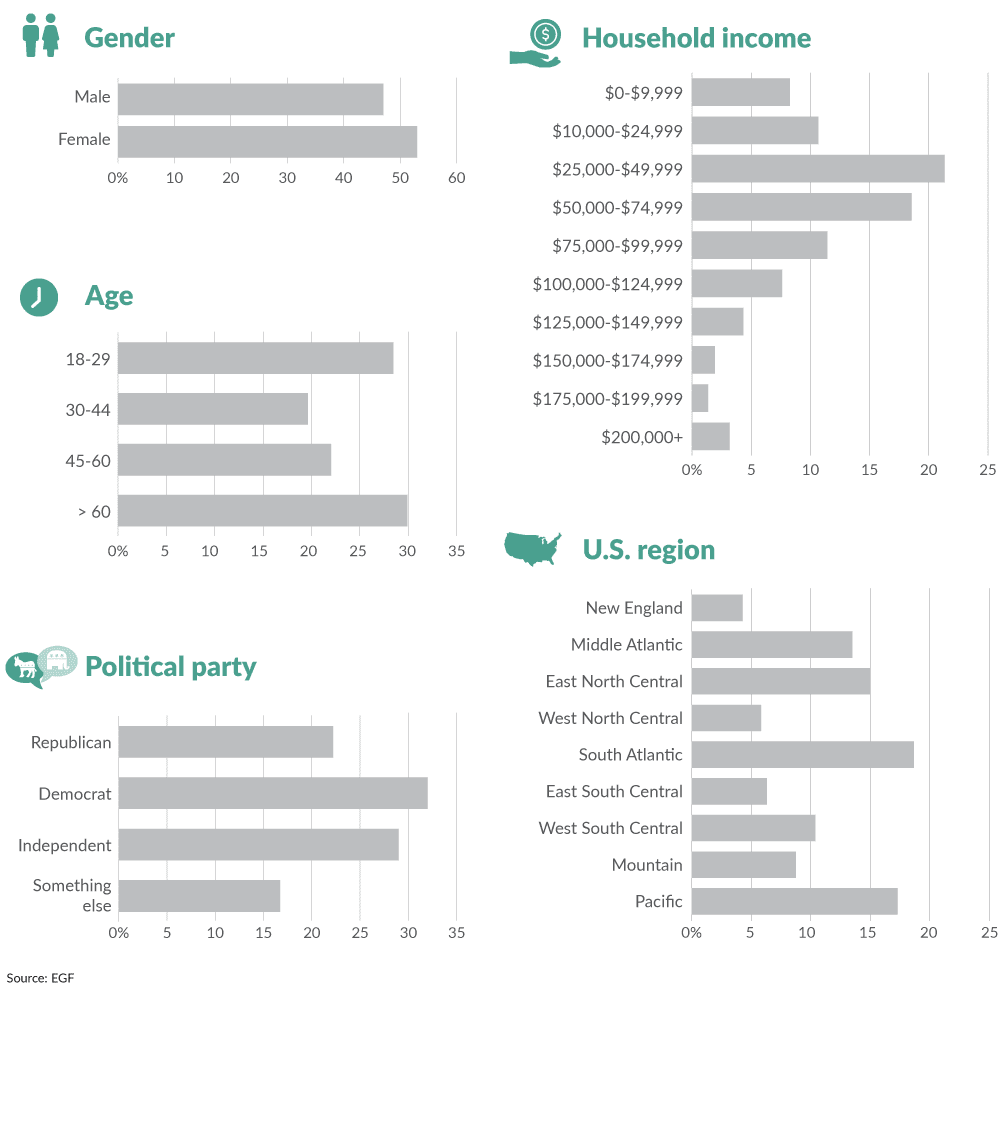
Specific Findings
American Exceptionalism
In Principle, Not Practice
The Americans we surveyed were nearly two-and-a-half times more likely to believe “America is exceptional because of what it represents” than to believe “America is exceptional because of what it has done for the world.” The strong preference for this particular understanding of American exceptionalism is consistent across partisan affiliations and age groups. This suggests support for American exceptionalism is not necessarily related to or synonymous with support for an activist or interventionist foreign policy.
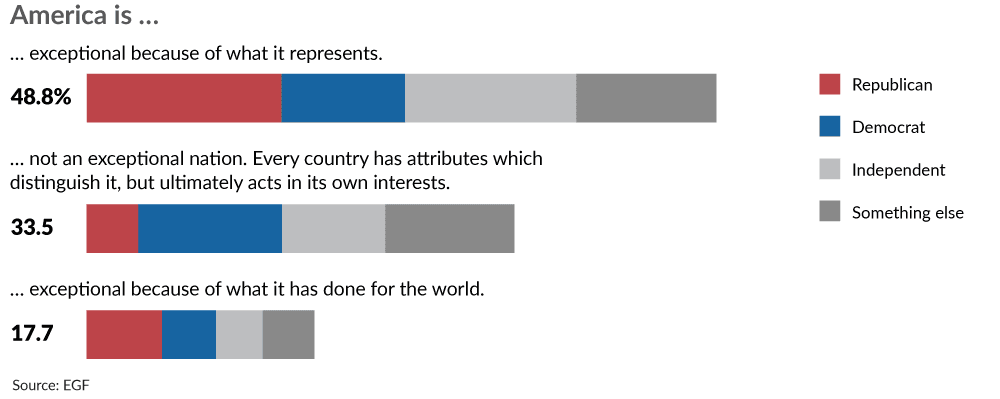
This differs from how political leaders typically refer to exceptionalism. At a presidential campaign event in 2011, Mitt Romney claimed, “we are an exceptional country with a unique destiny and role in the world… that of a great champion of human dignity and human freedom.”3 At a 2009 press conference in Strasbourg, France, President Obama elaborated his assertion, “I believe in American exceptionalism” by referring to the “sacrifices of our troops” and the “enormous amount of resources” invested in postwar Europe.4
Moreover, a plurality of Democrats and a plurality of respondents under 30 years old believe “America is not an exceptional nation. Every country has attributes which distinguish it, but ultimately acts in its own interests.”

There was another point in our survey which reinforced the observation of public support for the idea that America’s greatness and leadership comes less from its active intervention in global affairs and more from what it represents. When asked to select a statement which “best expresses your view,” 60 percent of our respondents chose “a great leader must lead by example” while only 10 percent chose “a great leader should try to change the world.” An additional 30 percent chose “in the real world, any leader must often choose the least of many bad options.”
Though this specific question does not explicitly refer to international relations, its placement in our survey leads us to interpret significant support for the kind of national leadership which is characterized by conduct and values worthy of emulation. This sentiment was recently expressed by Vice President Biden: “America’s ability to lead the world depends not just on the example of our power, but on the power of our example.”5
Threat Perception
It’s Coming from Outside
When asked about the “greatest threat” facing the United States during this century, Americans were split along partisan lines. Lack of trust in democratic institutions and a decrease in civic participation was significant, ranked second by Democrats, Republicans, and Independents alike. But to Republicans, this concern was overshadowed by a fear of “losing… national identity due to high levels of immigration.” Democrats and Independents ranked immigration last among four potential threats, and their number one preoccupation was with “a rise in populist and authoritarian governments [which] threaten democracy, human rights, and the rule of law across the world.” Among Republicans, this rise of authoritarianism was ranked second to the last, higher only than “trade wars that will damage America’s economy and trade relations with other countries.”
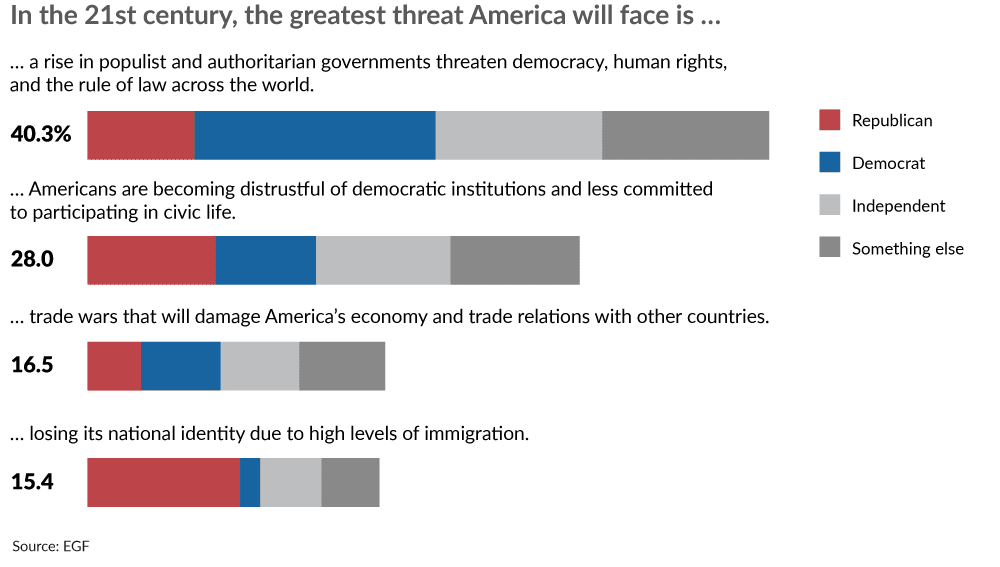
These results reflect a stark contrast in how people with different partisan identities view threats to national security. These lopsided views may be explained by “selective exposure”—in a fragmented news media environment, audiences segregate along ideological lines and stories to which they’re exposed reinforce existing perceptions and biases.6
The media’s role in political polarization is well documented, but the new research out from Harvard and MIT shows how an increasingly Breitbart-led conservative media ecosystem has intensified President Trump’s anti-immigration message among Republicans.7 Meanwhile, mainstream media outlets more heavily consumed by Democrats and Independents are dedicating significant coverage to the increasingly authoritarian regimes in Russia and China.
Peace Promotion
Beyond Military Dominance & Democracy Promotion
Ever since President Reagan popularized the phrase “peace through strength,” Republicans have supported America’s military dominance as a deterrent. Conversely, Democrats have traditionally sought to establish peace by promoting democracy and human rights around the world. So it was somewhat surprising that, when asked which of four options “best achieved and sustained” peace, military dominance and democracy promotion were the least popular. Instead, the most popular answer option among Democrats was “establishing, encouraging, and reinforcing global economic integration, as well as the growth of free trade” and the most popular answer option among Republicans was “keeping a focus on the domestic needs and the health of American democracy, while avoiding unnecessary intervention beyond the borders of the United States.”
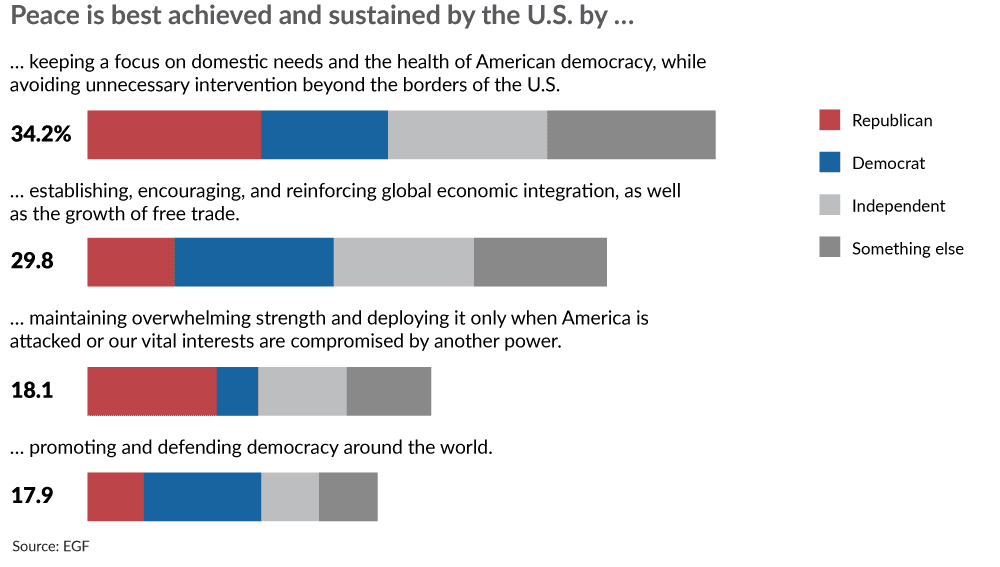
Some might see a paradox in Republicans’ support for “domestic needs” and Democrats’ support for “free trade” as the primary drivers of peace. After all, the Republican Party gave birth to the kind of neo-conservatism which advocated for preventive war, while Democrats are widely seen as the party of bread and butter domestic policy issues. Moreover, Democrats are traditionally the party of trade unions which most forcefully oppose free trade while Republicans are often associated with big, multinational corporations which are among its beneficiaries.
But again, the most striking observation is that the following two answer options, long regarded as the drivers of peace by foreign policy elites in the Republican and Democratic parties respectively, were roughly tied for last place: “maintaining overwhelming strength and deploying it only when America is attacked or our vital interests are compromised by another power” and “promoting and defending democracy around the world.”
Iran’s Nuclear Ambitions
The Desire for Diplomacy
Support for the Joint Comprehensive Plan of Action (JCPOA, commonly known as the Iran nuclear deal) has been a source of partisan division since the plan was enacted. During his candidacy, President Trump criticized the deal and promised to abandon it if elected. In May of 2018, the United States officially withdrew from the agreement.
We asked Americans how they thought the United States should respond if, in the wake of the withdrawal, “Iran gets back on track with its nuclear weapons program.” A bipartisan consensus in support of diplomacy over military action was both broad and deep. Approximately 80 percent of Americans chose one of the answer choices related to diplomacy: “working with… allies to impose stronger economic sanctions even if business interests of America and its allies are negatively affected” or “attempt to revive nuclear negotiations and pursue a diplomatic solution even if it means Iran is a nuclear power in the short term.”
This latter choice, which explicitly tolerates a nuclear-armed Iran, received more support than preventive military action by a factor of nearly five-to-one. The answer option for preventive military action (1) emphasizes the limited scope of the action and (2) acknowledges its possible consequence: “the U.S. should launch a preemptive strike on Iran to prevent its government from acquiring nuclear weapons, even if it risks starting a full-scale war.”
This was the least popular answer option among respondents of every partisan affiliation, as well as those who chose not to identify. It was less popular within each of these groups than the answer option, “the U.S. should not intervene. Iran has the right to defend itself even if it means developing nuclear weapons as a deterrent.” Clearly, after nearly two decades of U.S. military engagement in the Middle East, the public has little appetite for military confrontation with Iran despite public assertions from the Trump administration that “if Iran does anything at all to the negative, they will pay a price few countries have ever paid.”8
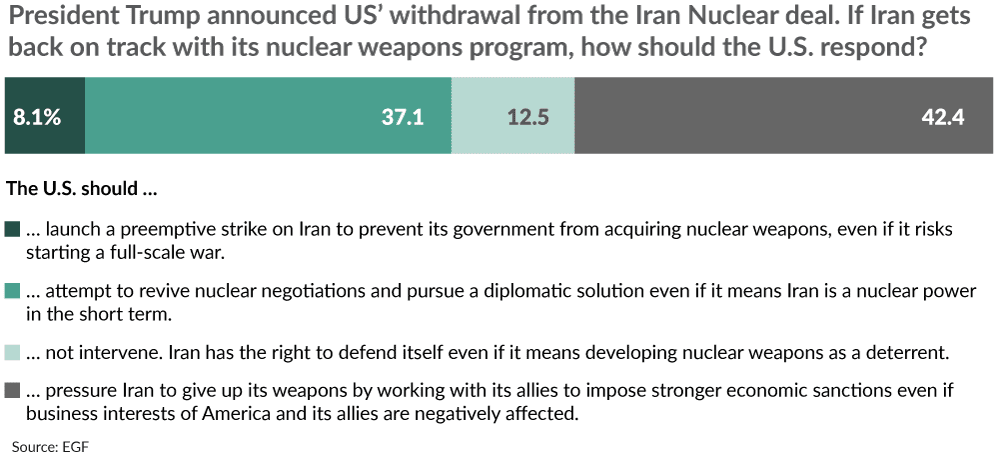
Responsibility to Protect
Or Not
Neoconservative interventionism often takes the form of preventive military action and “regime change” with the justification that these actions reduce the likelihood of future attacks upon the United States. Neoliberal interventionism often takes the form of military strikes upon dictators and foreign troops responsible for human rights abuses with justifications that we have a moral obligation to defend vulnerable populations and that doing so is conducive to global stability.
But just as liberal foreign policy leaders have supported preventive wars, conservative foreign policy leaders have pushed to deploy troops to stop humanitarian abuses. In fact, our content analysis shows a majority—approximately 60 percent—of foreign policy leaders have publicly expressed support for the United States interceding with force to protect vulnerable populations outside its borders.
According to our survey results, however, the American public is not as enthusiastic about United States-led overseas military operations when Americans are not directly threatened.

Abstinence from military intervention was the most popular approach for every age group, except for people older than 60 years old, when we combined responses for non-intervention.9 This older group did not support unilateral U.S. intervention into human rights abuses. They were more than twice as likely to believe “organizations such as the United Nations should take the lead in responding to human rights abuses, not individual countries such as the U.S.” than “the U.S. should use its influence, including military intervention, to stop human rights abuses.”
People under 30 years old were the most likely to want the United States to abstain from intervening in human rights abuses, and these young people were most likely to believe “the U.S. should fix its own [human rights] problems [‘such as mass incarceration and aggressive policing’] before focusing on other countries.”
When confronting human rights abuses, consistently across party affiliations, restraint was the first choice, U.N. leadership was the second choice, and American intervention was the last choice.
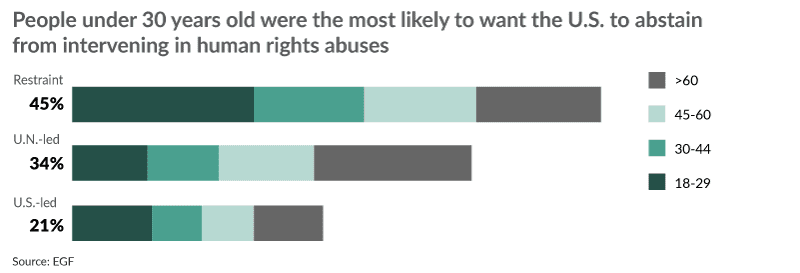
NATO Military Retaliation
Treaty-Bound or War’s Unsound?
After reading a hypothetical situation in which a NATO ally in the Baltics is invaded by Russia, reminded of the treaty’s requirement for mutual defense, and told “the only way to expel Russia… is a military response,” Americans were deeply ambivalent on whether to retaliate. Fifty four percent supported military action while 46 percent opposed. These results are similar to those of a recent survey by the Chicago Council on Global Affairs.10 We probed with follow-up questions to understand the primary drivers of Americans’ support for or opposition to retaliation.
In recent decades, Russia has invaded parts of neighboring countries with no military response by the US. Russia has just invaded Estonia, a small, democratic country which is on Russia’s western border. Estonia had been occupied by Russia from 1940 until it gained independence in 1990. In 2004, it joined NATO, the American-led alliance established after World War II which requires member countries defend each other militarily. In response to Russia’s invasion, Estonia’s government invokes the NATO treaty and calls upon allies to help it to fight the Russian troops. The only way to expel Russia from Estonia is a military response.
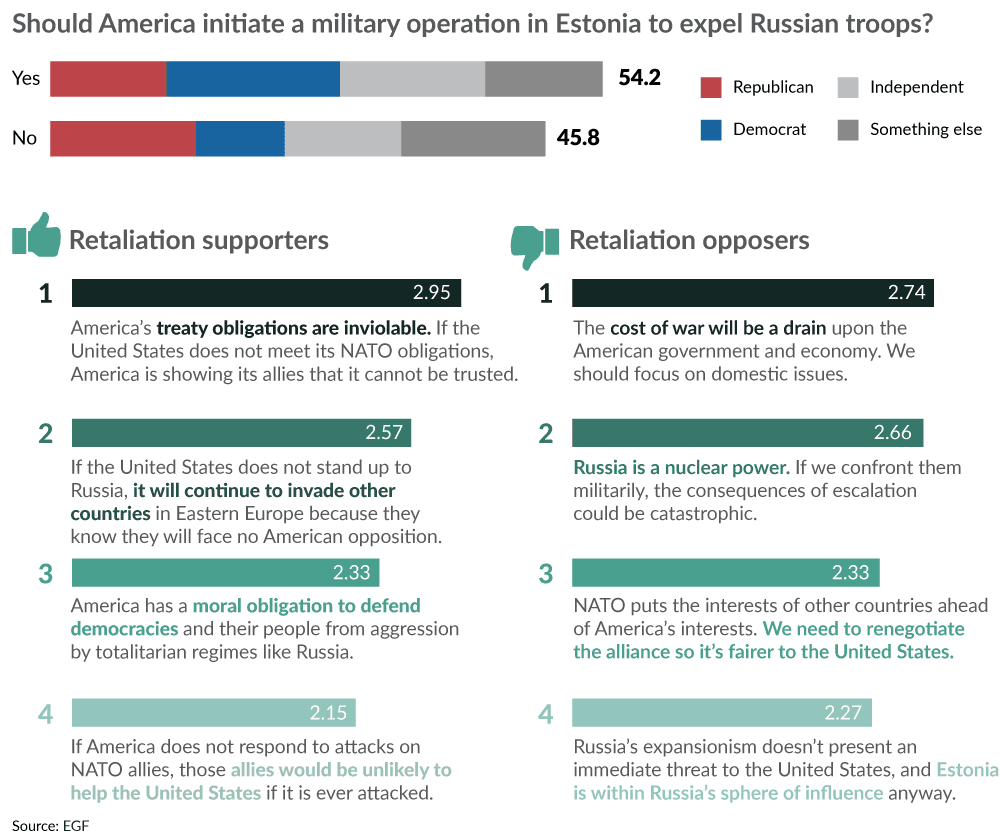
There was some expected variation between party identification, with two-thirds of Democrats and a slight majority of Independents opting for retaliation and a slight majority of Republicans opposing it.
We asked respondents who supported retaliation to rank in order of importance four commonly given rationales and then weighted the results. Notably, a straightforward desire to live up to our treaty obligations received the most responses, whereas the choices which contained the underlying rationales of the NATO alliance received less support.
We asked respondents who opposed retaliation to rank in order of importance four rationales for opposition and then weighted the results. Here, an apparently war-weary public expressed reluctance based on anticipated costs and consequences of a conflict with Russia and less on ideological and isolationist grounds.
It should be noted here that, while the public is somewhat evenly split on whether to go to war in support of our Article Five obligations under NATO, there is no ambivalence among foreign policy leaders. An overwhelming majority—95 percent—of those whose writings are included in our content analysis supported armed retaliation.

Defense Spending
Reduce, Reallot, or Restore?
The U.S. military is an institution which enjoys a high level of public confidence. Yet the amount the government spends on the military’s budget is a topic of public disagreement. Other polling organizations have asked respondents whether they think the amount spent on the military is too much, about right, or too little, and generated predictable party-line results.11 However, we did not want to presume our respondents had a definite opinion on the topic nor the information readily available to develop an informed one. So, in order to provide balanced information with neutral language, our question informed respondents of the cost of the defense budget as a comparison to that of other countries in both absolute figures, and as a proportion of the countries’ economies:
“Today the United States budgets $610 billion each year for its national defense, more than any other country. By comparison, the next three countries in descending order of military spending are: China ($228 billion), Saudi Arabia ($69.4 billion), and Russia ($66.3 billion). As a percentage of its overall economic output (GDP), the U.S. ranks fourth in military spending, after Saudi Arabia, Israel and Russia.”12
We then asked, “Do you think American lawmakers should increase, maintain, or decrease our current level of military spending?” Almost half (45 percent) of respondents thought lawmakers should maintain the level of military spending. Of the remaining respondents, more than twice as many thought we should decrease the level of spending than thought we should increase it.
As with a recent Gallup poll,13 we found more Democrats than Republicans wanted to decrease military spending, and more Republicans than Democrats wanted to increase spending. But unlike that poll, our survey showed Republicans significantly more likely to support current levels of military spending than wanting to increase spending.
As with the NATO question, we asked follow-up questions to probe further as to why respondents supported increasing or decreasing America’s defense spending. We asked people to rank three possible rationales and then weighted the results. The most popular rationale for decreasing military spending was the United States “has other priorities on which it could be spending this money.” This second most cited rationale was that the current “level of military spending is fiscally irresponsible” and that we should prioritize “pay[ing] down the national debt or reduc[ing] taxes.” Interestingly, the fewest people chose “the U.S. does not currently face enough of a security threat to justify the current level of military spending.” So even respondents who perceive real threats nevertheless want to reduce military spending to allocate for other priorities.
The most salient reason to increase military spending relates to perceptions of a weakened military under President Obama and a wish for it to be “restored to its full strength.” This was closely followed by the need to remain “the most powerful nation in the world” as “countries like Russia and China are becoming more powerful” and “enemies like ISIS” persist. The least salient reason to increase military spending had to do with America’s role as a global leader, “called upon not only to defend the American people, but to provide for the security of our allies and, to some extent, the world”. Even people who’d like to see us spend more on the military appear driven by a desire to reverse the budget cuts toward the end of the Obama administration, and report little appetite for the provision of security on a planetary scale.

General Worldview
Declaring Independence
To move beyond specific foreign policy preferences to an understanding of respondents’ broader views about the country’s foreign policy approach, we operationalized three worldview types described by Ian Bremmer in his book Superpower: Three Choices for America’s Role in the World. We found that significantly more Americans hold an “Independent America” worldview (i.e., America must focus more on its own domestic challenges than on the challenges that come with international leadership) than either an “Indispensable America” worldview (i.e., American leadership is necessary for global stability and therefore American peace and prosperity) or a “Moneyball America” worldview (i.e. foreign policy should be driven by a focused calculation of costs and benefits to the national interest).
Far from indicating a reflexive isolationism of one political or demographic group, the identification with an “Independent America” worldview—as measured by an aggregate of three survey questions designed to correspond to these three categories—was stronger than the identification with the two other worldviews across every age group, partisan political identification, and income level we surveyed. And it was stronger with high information than with low information respondents.
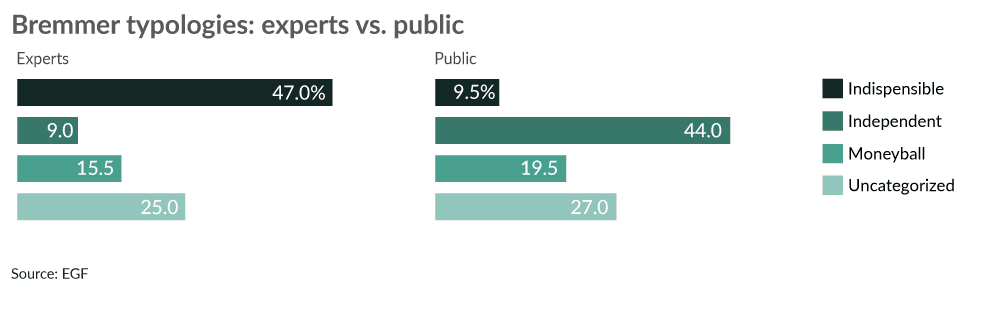
A separate content analysis of the published opinions of foreign policy leaders shows that the expressed worldviews of experts are inversely related to the public’s worldview. According to our methodology, among the public, 44 percent ascribe to an “Independent America” worldview and 9.5 percent ascribe to an “Indispensable America” worldview. Among experts, 47 percent ascribe to an “Indispensable America” worldview while just 9 percent ascribe to an “Independent America” worldview.
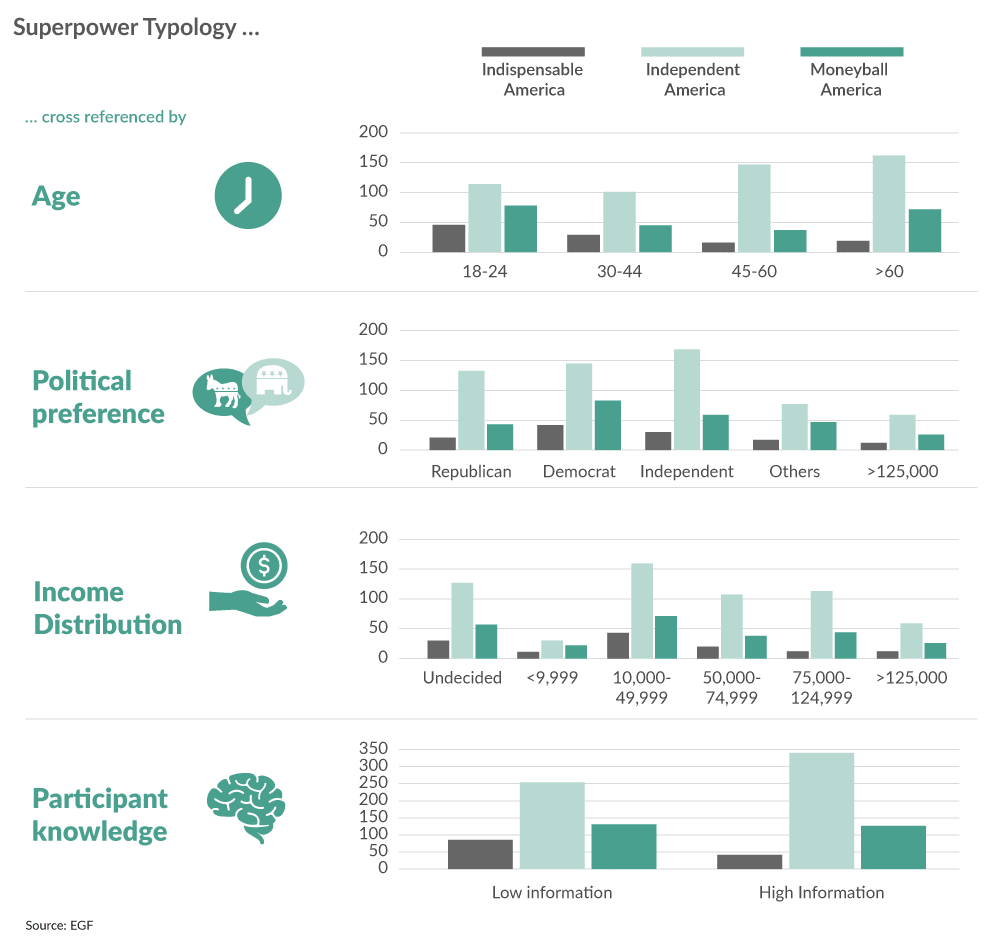
Using Mead’s typology, we found some differences in worldview by party identification. According to our study, Republicans and Independents are significantly more likely to fit a “Jeffersonian” type, which “hold[s] that American foreign policy should be less concerned about spreading democracy abroad than about safeguarding it at home.” Democrats are significantly more likely to fit a “Wilsonian” type, which “believe[s] that the United States has both a moral obligation and an important national interest in spreading American democratic and social values throughout the world, creating a peaceful international community that accepts the rule of law.” We also categorized people into a “Jacksonian” type (which “believes that the most important goal of the U.S. government in both foreign and domestic policy should be the physical security and economic well-being of the American people”) and a “Hamiltonian” type (which “regard[s] a strong alliance between the national government and big business as the key to both domestic stability and to effective action abroad”).14

While the public is somewhat evenly split among Jeffersonians and Wilsonians, the foreign policy experts we analyzed were significantly more likely to fit within a Wilsonian framework than any other category. Given that Jeffersonians are identified with support for a more restrained foreign policy and Wilsonians advocate a more expansive and internationalist approach, this finding adds further support to the observation that foreign policy experts and the public have measurably and meaningfully different visions for America’s appropriate role in the world.
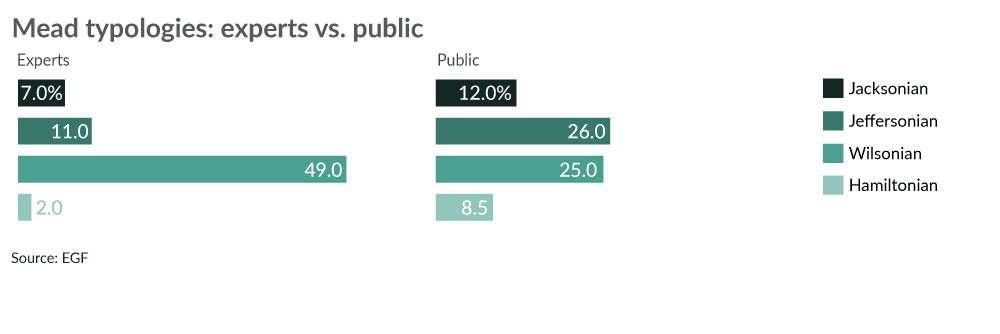
Conclusion
There are two primary conclusions to be reasonably drawn from this study. First, the public desire for a more restrained U.S. foreign policy is significant and diverse. It crosses party lines and generational boundaries. Our survey results show the American public’s preference for getting its own house in order and avoiding international entanglements is broad based. It is limited to neither the ultranationalist corners of the Republican party nor the reflexively pacifist corners of the Democratic party, as pundits so often suggest. This sentiment is possibly a product of the public dissatisfaction with the recent war in Iraq and the ongoing war in Afghanistan, as well as with recent instances, such as Libya, where humanitarian-minded military interventions created power vacuums which hurt the people the United States attempted to help.
The second conclusion is that a chasm persists between what Americans believe is their country’s appropriate role in the world and what foreign policy leaders believe. Our content analysis reveals that foreign policy leaders take a more interventionist posture on every policy issue we tracked. In short, there is a stark division between voters’ expressed interests in the realm of foreign policy and what foreign policy leaders believe is in voters’ interests. And this produces a thorny paradox—and potentially opens the United States to charges of hypocrisy—when foreign policy leaders attempt to champion responsive and representative governments around the world.
• The public desire for a more restrained U.S. foreign policy crosses party lines and generational boundaries.
• There is a stark division between voters’ expressed interests in the realm of foreign policy and what foreign policy leaders believe is in voters’ interests.
This second conclusion is consistent with a growing body of literature which reflects the disconnect between foreign policy leaders and the public. The first conclusion, however, departs from conventional wisdom of foreign policy think tanks, which often focus on support for a more “engaged” foreign policy. But this departure is a matter of emphasis and depends on the kinds of questions asked. To be sure, we do not find Americans want to withdraw from the world. Support for international trade, for example, is significant. But we do find the American public is more reluctant and restrained when it comes to the use of force than other surveys have indicated.
Part of this might be attributable to the specificity of our questions and answer choices. While the specificity contained in our answer choices might increase the possibility respondents are “primed” to think about information they wouldn’t have otherwise, broad questions about America’s global role are likely to be more susceptible to the effects of social desirability bias—that is, when unsure of their own position, survey takers will select the answer choice which sounds most popular. In attempting to assess public opinion, we sacrificed concision for precision.
Although our survey results are consistent and conclusive, we did not measure the prioritization of foreign policy topics relative to domestic policy topics. Indeed, public opinion polling regularly reveals that foreign policy concerns are subordinate to economic and social issues among voters. So, while foreign policy leaders have a democratic duty to engage with the views of the American public, the American public has an opportunity to make sure its views are more clearly and forcefully shared with foreign policy leaders. Hopefully, this report has made a modest contribution toward realizing that opportunity.
Methodology
This survey was developed by EGF. The survey instrument was written by EGF research fellow Mark Hannah with help from two research assistants.15 It was distributed online to a geographically and demographically diverse national sample of 1,185 voting-age adults between July 17, 2018 and July 18, 2018. This period follows a week in which the NATO summit was hosted in Brussels and in which President Trump and President Putin met in Helsinki. We have no reason to believe news of these events had an effect on some of our responses, but we are unable to rule out such a possibility.
Answer choices for all non-demographic multiple- and rank choice-type questions were randomized.
For questions about support for military spending and the potential for retaliation should a NATO ally be attacked by Russia, we set up a factorial vignette—an experiment embedded into a survey in which the respondent is exposed to new information before selecting an answer choice. Factorial vignettes enabled us to probe more deeply than standard public opinion polls, by posing a hypothetical scenarios, or giving context, and then asking respondents how they would respond in such scenarios, and the reasons for their response.
Partisan identity is based on responses to the commonly used partisan self-identification question: “Generally speaking, do you usually think of yourself as a Republican, a Democrat, an Independent, or something else?”
There are a couple references to “high information” or “low information” voters. We operationalized this independent variable by asking two multiple choice questions. Those we categorized as “high knowledge” correctly answered both questions while those who answered either one or zero of those correctly were coded as “low knowledge.”
Three questions which correspond to the typology described in Bremmer’s Superpower were taken directly from a set of ten questions posed in the book’s introduction.16 Two of the three questions which correspond to the typology described in Mead’s Special Providence were reviewed—and a third question was supplied—by Professor Mead. The Bremmer and Mead worldview types were assigned to respondents who answered at least two of the three questions which correspond to each respective typology in a consistent way. This is an approximate metric, since the use of survey questions to determine type is necessarily limited to one’s self-reported opinions at a single moment and thus fails to account for changes in opinions over time.
The statistical significance of relationships between independent variables (e.g., age category and partisan affiliation) and dependent variables (e.g., multiple choice answers) was established using Pearson’s chi-squared test.
We conducted a content analysis of writing by foreign policy leaders (or “experts”) by taking a random sample of 45 individuals whose articles appeared in Foreign Affairs, published by the Council on Foreign Relations, in the past three years. We then used simple search engine queries of these names and topic identifiers (e.g., “human rights,” “Iran nuclear deal,” “NATO,” “defense budget,” etc.) to identify publicly expressed opinions related to several of our survey questions, and infer categorization within the typologies.
Endnotes
1 See, for example: Benjamin Page with Marshall Bouton. The Foreign Policy Disconnect: What Americans Want from Our Leaders but Don’t Get. Chicago, IL: University of Chicago Press, 2006. Bruce Stokes. “Killer Elite.” Foreign Policy. January 07, 2014. Retrieved from: https://foreignpolicy.com/2014/01/06/killer-elite/. Jacob Poushter. US Foreign Policy Experts Differ from Public on Threats to Country. Pew Research Center. May 09, 2018. Retrieved from: http://www.pewresearch.org/fact-tank/2018/05/09/u-s-international-relations-scholars-global-citizens-differ-sharply-on-views-ofthreats-to-their-country/.
2 For prominent examples from each of the opposing camps, see: Benjamin Page & Robert Shapiro, The Rational Public: Fifty Years of Trends’ in Americans’ Policy Preferences. Chicago, IL: University of Chicago Press, 1992. Bryan Caplan, The Myth of the Rational Voter: Why Democracies Choose Bad Policies. Princeton, NJ: Princeton University Press, 2007.
3 “Text of Mitt Romney’s Speech on Foreign Policy at The Citadel.” Washington Wire blog of the Wall Street Journal. October 7, 2011. Retrieved from: https://blogs.wsj.com/washwire/2011/10/07/text-of-mitt-romneys-speech-on-foreign-policy-at-the-citadel/
4 “The President’s News Conference in Strasbourg.” The American Presidency Project. April 4, 2009. Retrieved from: http://www.presidency.ucsb.edu/ws/index.php
5 Joe Biden, “Reclaiming America’s Values.” New York Times, September 14, 2017. Retrieved from: https://www.nytimes.com/2017/09/14/opinion/joe-biden-more-perfect-union.html
6 Natalie Jomini Stroud, Niche News: The Politics of News Choice. New York, NY: Oxford University Press. 2011.
7 Yochai Benkler, Robert Faris, Hal Roberts, and Ethan Zuckerman. “Study: Breitbart-led right-wing media ecosystem altered broader media agenda” The Columbia Journalism Review. March 3, 2017. Retrieved from: https://www.cjr.org/analysis/breitbart-media-trump-harvard-study.php
8 Patrick Wintour and Saeed Kamali Dehghan. “John Bolton backs Trump’s Iran threat: ‘They will pay a price,’” The Guardian. July 23, 2018. Retrieved from: https://www.theguardian.com/us-news/2018/jul/23/trump-iran-latest-john-bolton-threat
9 The response options which effectively supported abstinence from the use of force were: “The U.S. has its own domestic human rights problems, such as mass incarceration and aggressive policing. The U.S. should fix its own problems before focusing on other countries” “While the loss of any innocent human life is tragic, U.S. troops should only be put at risk if there’s a threat to American national security.”
10 Which also found 54 percent support in defending Baltic NATO allies with U.S. troops if Russia invades, but slightly less opposition at 42 percent. From: Dina Smeltz, Ivo Daalder, Karl Friedhoff, Craig Kafura, and Lily Wojtowicz, “America Engaged: American Public Opinion and U.S. Foreign Policy.” (2018). The Chicago Council on Global Affairs. Retrieved from: https://www.thechicagocouncil.org/sites/default/files/report_ccs18_america-engaged_181002.pdf
11 Frank Newport. “Americans Not Convinced U.S. Needs to Spend More on Defense.” Gallup. February 21, 2018. Retrieved from: https://news.gallup.com/poll/228137/americans-not-convinced-needs-spend-defense.aspx
12 For the source of these figures, see: Stockholm International Peace Research Institute. “Global military spending remains high at $1.7 trillion.” May 2, 2018. Retrieved from: https://www.sipri.org/media/press-release/2018/global-military-spending-remains-high-17-trillion
13 Newport. “Americans Not Convinced…”.
14 Walter Russell Mead, Special Providence: American Foreign Policy and How It Changed the World. 2001. Alfred A. Knopf. Xvii
15 The author wishes to acknowledges the capable assistance of EGF’s talented summer interns, Keenan Ashbrook of Cornell University and Cartland Zhou of New York University. Srijoni Banerjee of Johns Hopkins University’s School of Advanced International Studies has provided more recent assistance. 16 Specifically questions 2, 8, and 10.
About the Author
Mark Hannah is a senior fellow at EGF. He teaches at New York University and taught previously at The New School and Queens College. He is a term member of the Council on Foreign Relations and a political partner at the Truman National Security Project. He studied at the University of Pennsylvania (B.A.), Columbia University (M.S.), and the University of Southern California (Ph.D.).
This post is part of Independent America, a research project led out by IGA senior fellow Mark Hannah, which seeks to explore how US foreign policy could better be tailored to new global realities and to the preferences of American voters.













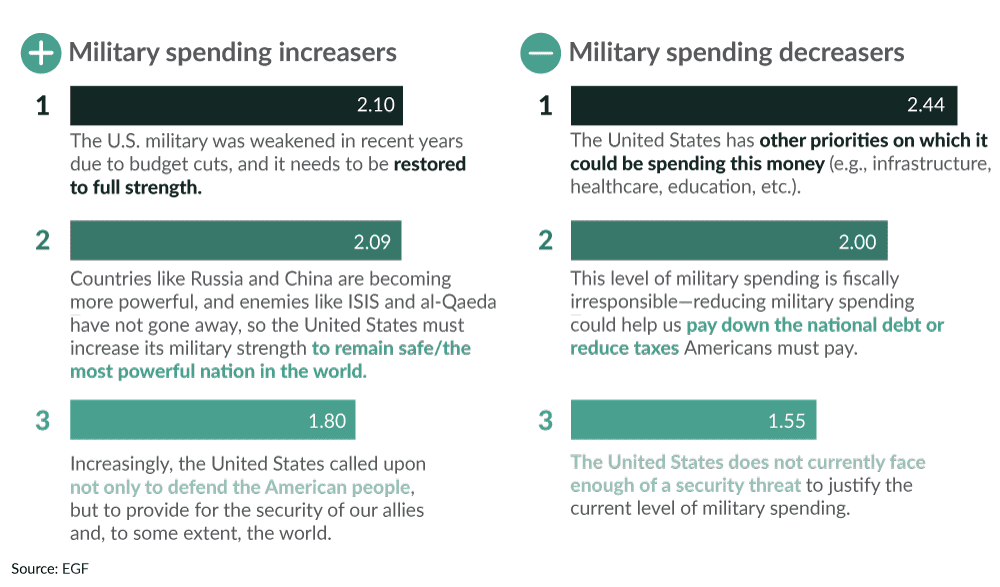
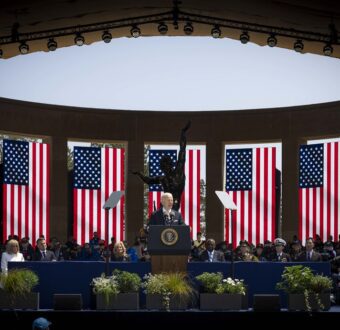
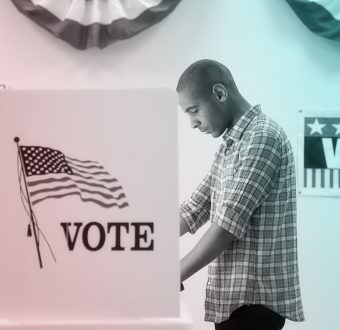



NATO at 75: What’s Its Future?